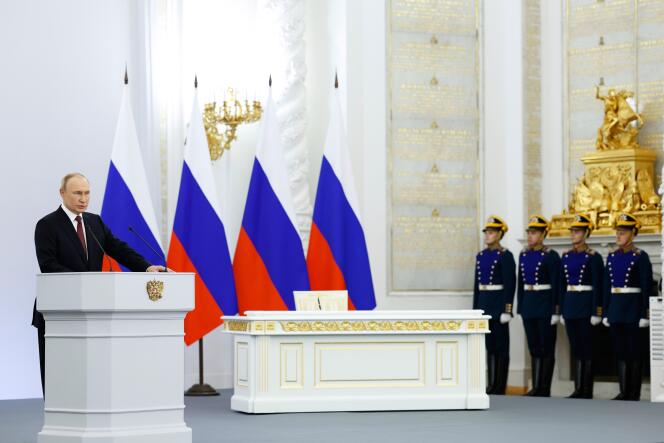
Russian President Vladimir Putin has signed treaties to begin the process of absorbing parts of Ukraine into Russia, on Friday, September 30, defying international law.
In a ceremony in the Kremlin's opulent white-and-gold St. George’s Hall, Putin and the heads of the four regions of Ukraine put their names on treaties for them to join Russia. The action represents a sharp escalation in the seven-month conflict in Ukraine.
The signing came three days after the completion of Kremlin-orchestrated "referendums" on joining Russia that were dismissed by Kyiv and the West as a bare-faced land grab, held at gunpoint and based on lies.
The separatist Donetsk and Luhansk regions in eastern Ukraine have been backed by Moscow since declaring independence in 2014, weeks after the annexation of Ukraine’s Crimean Peninsula. The southern Kherson region and part of the neighboring Zaporizhzhia were captured by Russia soon after Putin sent troops into Ukraine on February 24.
Both houses of the Kremlin-controlled Russian parliament will meet next week to rubber-stamp the treaties for the regions to join Russia, sending them to Putin for his approval.

'Citizens forever'
In a speech preceding a treaty-signing ceremony, Mr. Putin warned his country would never give up the occupied areas and would protect them as part of its sovereign territory.
"I want to say this to the Kyiv regime and its masters in the West: People living in the Lugansk, Donetsk, Kherson and Zaporizhzhia (regions) are becoming our citizens forever," Mr. Putin said, adding that they had made a "unambiguous choice" to join Russia.
"It is out of greed, with the aim of maintaining its unlimited power. These are the real reasons for this hybrid war that the West is waging against us [...] They want to make us into a colony," Mr. Putin added in televised remarks.
The head of the Kremlin also urged Kyiv to stop all military action in Ukraine: "We call on the Kyiv regime to immediately stop fighting and stop all hostilities [...] and return to the negotiating table."
International reaction
The Group of Seven foreign ministers (G7) said on Friday that they would "never recognize" Russia's annexation and pledged further sanctions against Moscow.
The foreign ministers of Britain, Canada, France, Germany, Italy, Japan and the United States as well as the High Representative of the European Union called on "the broader international community to reject Russia's brutal expansionist."
They said, "We will impose further economic costs on Russia and on individuals and entities – inside and outside of Russia – that provide political or economic support to these violations of international law."
The US announced a long list of new sanctions on Friday, with the US Treasury placing sanctions on 14 people in "Russia's military-industrial complex" and 278 members of the legislature, particularly members of the Federation Council, the upper house, for their support of the invasion of Ukraine. Both the US and Britain put sanctions on Russian Central Bank Governor Elvira Nabiullina.
US President Joe Biden condemned Russia's "fraudulent" declaration.
"Russia is violating international law, trampling on the United Nations Charter and showing its contempt for peaceful nations everywhere," President Biden said in a statement.
NATO Secretary General Jens Stoltenberg also rejected Russia’s “illegal and illegitimate” annexation.
"NATO allies do not and will not recognize any of this territory as part of Russia," he said.